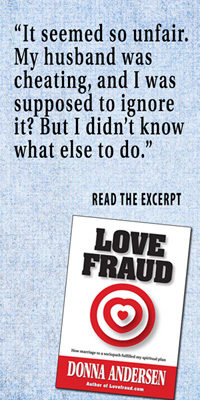 I had been married to James Montgomery for about a year and a half, and he went on overnight and weekend “business trips” the entire time. I didn’t want to think about what he was doing — until I had to.
I had been married to James Montgomery for about a year and a half, and he went on overnight and weekend “business trips” the entire time. I didn’t want to think about what he was doing — until I had to.
By Donna Andersen
My husband was cheating on me. The letter from the Bank of Boston credit card department confirmed it.
This was the credit card I had given to James. He spent the money; I paid the bills. On the March statement was a charge for the Berlin Motor Lodge. I knew exactly where this place was and what it looked like. It was a small highway motel on Route 73 in Berlin, New Jersey, 35 minutes from where we lived in Atlantic City. There was absolutely no reason for James to be there, except to rendezvous with another woman.
When I saw the charge on the statement, I knew in my heart what it meant. But I hoped it was a mistake, that there was some other logical reason for it. So I decided not to think about it until I had proof. I submitted a formal request to the Bank of Boston for an investigation.
The results were in my hand—copies of the registration card and credit card slip. James had indeed filled out the registration card, giving a Florida address. He had scrawled his unmistakable signature on the credit card slip at 9:40 a.m. on Tuesday, February 10—two weeks before we went to Paris.
I had my proof.
I was shaken.
What should I do?
I was alone with my problem—who could I talk to about it? I wasn’t sure that I wanted to talk to anybody—then I might have to start talking about everything else that was going on in my marriage. The lies. The financial problems. The frequent business trips on weekends. I didn’t know where such a discussion would lead.
So I turned to my library of self-help books. I looked for an answer in What Every Woman Should Know About Men, by Dr. Joyce Brothers, who wrote an advice column in Good Housekeeping magazine for almost 40 years. Chapter 25 of her book was about infidelity. She said 60 percent of men were unfaithful at some point in their marriages. Most men cheated not because they wanted to leave their wives, but because they wanted a little excitement. They didn’t take the affair seriously. So if a woman found out about an affair, Dr. Joyce Brothers advised her to do absolutely nothing.
“It takes every bit of discipline and pride a woman can muster to do nothing, to go on with her daily routine,” Brothers wrote. “But this is by far the wisest course. No ostentatious moping, no nasty remarks. Her energies should go toward being as pleasant and tender as possible. This is a time to make home and home life as appealing as she knows how.”
The idea, Brothers said, was to wait it out. Sooner or later, the husband would tire of the affair, and married life would return to normal. A confrontation, however, would require an ultimatum, which could end the relationship.
It seemed so unfair. My husband was cheating, and I was supposed to ignore it? But I didn’t know what else to do, so taking the famous psychologist’s advice seemed like a reasonable plan. Plus, I had a lot of money invested in my relationship, and finally, with the Titanic show, a chance to recover it. If I threw James out, I didn’t know what would happen to my money. So even though I felt numb with shock, or maybe because of it, I did exactly what Dr. Joyce Brothers recommended.
Nothing.




































 Wednesday webinar: Escaping the Sociopath and Rebuilding Your Life
Wednesday webinar: Escaping the Sociopath and Rebuilding Your Life